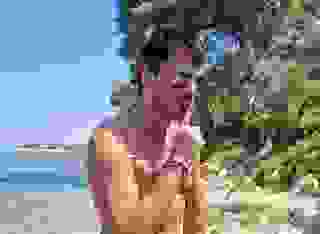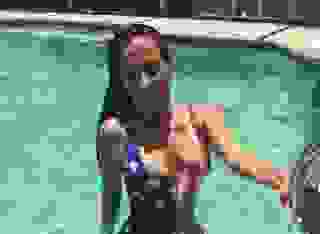- Gay Male
- The Heart is a Poor Judge Ch. 07
Note: You can change font size, font face, and turn on dark mode by clicking the "A" icon tab in the Story Info Box.
You can temporarily switch back to a Classic Literotica® experience during our ongoing public Beta testing. Please consider leaving feedback on issues you experience or suggest improvements.
Click hereI've just been called a pervert for wanting to know about their first intimate moments together. My accuser is Miguel, of course, who casually brings the term into play amid a sudden bout of laughter. Caught off guard, I stutter defensively, but he assures me he is only messing around.
"Tell you what, I'd be pissed if you left that stuff out. That's called censorship. What did the kid say about it?"
Every single week, through one avenue or another, he arrives at this question. I remind him how he's always the first in line for questioning—that I will ask Gabe later, at home.
"Fine, fine," he says, shooing me away with his hand. "Just tell me what he says, next week."
I promise him I will.
Early in the evening, As Gabe joins me in the front room, I decide to lead with the same question that had prompted Miguel's outburst. He takes his seat across from me, next to the decommissioned player piano. He smooths the front of his chambray button-down with intent, as if the studio microphone directed at him were instead a television camera. Sunlight spills into the room through the west-facing bay window. A hot white shaft of it drapes neatly over his left shoulder.
I keep my eyes trained on his, nut-brown and wandering, until they finally resolve to mine. And they stay put. Eye-contact is a funny thing with Gabe. Sometimes, even for entire conversations, it's impossible to capture. But then, in moments like these, I get a little rush as I become the sudden target of his laser-guided focus.
Cool air whooshes from a vent nestled in the carpet. I take a quick breath and ask, "Will it make you uncomfortable if I include the sex?"
As is so often the case, Gabe presents me with a more nuanced point of view: "I just don't see how you could avoid it. In those early days, the physical component was inseparable from the emotional. If you really want to tell a story, don't leave it out. I understand the temptation. You're trying to solve a problem. But you'll just end up causing more."
Nodding along, I jot down: "early days - physical inseparable from emotional."
"Anyway," he says, "you're not actually going to leave it out, are you? No matter what we say. You're just hunting for a reaction, right?"
I look up. Those quivering irises haven't left me yet. "Yes, that's right."
—
When Gabe woke up, Miguel and Eddie had been talking about dreams. He remembered that. Eddie's description had unraveled, vivid and forthright, so unlike anything the man had ever described before. Was it because he thought Gabe was sleeping? Maybe he shared a more vulnerable rapport with Miguel when Gabe was not around. Whatever the case, Eddie's words arrived so unexpected that there was a twilight moment in which Gabe wondered whether he himself might be dreaming.
He had been feeling that way a lot lately, suspended in a not-quite-waking state ever since his mother died. At times he fantasized that he might, at literally any moment, wake up and find her still alive, in vastly better condition than what he remembered of her toward the end. "I thought you were sick," he would say. She would be on her way out the door to teach creative writing at UCLS, where she was adored by her students. She would pause, look at him strangely and say, "I've never felt better." But this fantasy did not stop with his mother—Gabe himself would be different somehow, would be better, could already claim a modest list of his own accomplishments, whatever they might be. It was a version of himself who never quite came into focus in his mind, but whom he envied just the same.
...Or maybe, he would wake to find he was someone completely different...someone who, with any luck at all, starred in a gorgeous life, unknown to him now, but instantly, entirely familiar upon waking. Maybe he was a woman. He had no particular desire to be one, and yet, would it seem so out of place if it turned out he had been one all along? Maybe this woman was tall; perhaps she was cared for by a handsome man who was even taller and she wrote about literature. She would sit up in bed, clutch her expensive Japanese linens, look over at her sleeping husband and think, "Huh," as the nearly nineteen-year-long gray sea of Gabe's life compressed down to twenty minutes' worth of unusually inventive sleep.
But his life wasn't quite a gray sea, was it? As compelling as his fantasies were at times, there was, increasingly, something keeping him here in this existence—which was probably real, and therefore his to sort through. Or rather, someone. Even in those imagined lives, Gabe doubted he could ever forget him. It would be like a curse, an eternal haunting by the memory of the beautiful young man he (or she) could have sworn existed, lost in some other place and time.
Almost two weeks had passed since their night on the rock, the skullcap of a giant, as Miguel had later described it. Nothing sexual had transpired between them since then, and when Gabe brought it up after a few days, Miguel had shrugged and said, "There are so many other ways of getting to know a person." Gabe thought it was an impressive display of self-control on Miguel's part, one that unfortunately made him ever more desirable.
Gabe had responded in the most clever way he could think of, which was to agree and make a show of his own restraint. It was, he figured, the most likely way for him to eventually get what he wanted.
—
Friday, July 23rd, 1999
"I'll die if we spend another another night at home."
"Where do you want to go?" Gabe asked, propped in the doorway of Miguel's tiny office at the back of the warehouse—so small that they could not comfortably share the space.
Miguel spun around on an ancient metal desk chair. "You mentioned Chinatown before. What do you like so much about it?"
"The food. The narrow streets. And I guess it's just one of those places people are afraid of, even though there's no reason to be. Which means you don't have to worry about running into anybody like that when you're there."
"You mean white people."
"That's not what I mean."
"There are some good bars in Chinatown. Tom Lo's. It's open all night."
"And they don't check IDs?"
Miguel braked, skidding his shoe across the green carpet. "Lo's? Never."
"Where are we going to put the car?"
"We'll leave it here, dummy."
Gabe relayed a doubtful look, but Miguel didn't notice, or otherwise pretended not to see it. "Fine."
Miguel put his hands together. "It's a plan, then."
Gabe felt strange about leaving the car on its own in the dark warehouse. He had never parked it anywhere overnight if not jammed in among a sea of other vehicles at the park-and-ride, or just once in that overloaded, nondescript garage. And yet, it was probably safer here than any other place. He knew that, but something about the whole situation made the muscles in his back twitch.
They stormed through the night toward the station, soon beneath torn, dusty awnings displaying the names of shops that had long ago shut their doors, windows black, interiors dissolved into murky hibernation. Only in Odinberg did true vacancy bear out. Gabe imagined what would become of an empty strip like this, were it in his own neighborhood. Any vacant shops there were immediately reoccupied. (Never mind whether such occupation was legal.) Open retail space was simply too valuable, eternally in short supply. If only vacant homes, like his own, were as coveted.
"Is he around?"
"Is who around?"
Miguel cast him a sideways glance. "The Willow Man."
Gabe looked away, offended once again at Miguel's boldness and clumsy curiosity. He fought off, with great difficulty, the feeling of being mocked, even though a deeper part of him knew Miguel meant him no harm. "No, he's not around."
"How do you know?"
It took all of his strength not to blow up at Miguel. He had never met anyone quite so inept at leaving well enough alone. "He's just not—thank God. Can we be content with that?"
"We can," Miguel assured him. "Of course we can."
"Good."
The conversation dwindled until after they had boarded the train.
"What do you have against white people, anyway?"
It was Gabe who had pulled this question from almost nowhere. His own words surprised him—probably more than Miguel was surprised to hear them.
"Nothing."
"You said I meant white people."
"What?"
"Back at the warehouse, you said I meant white people, when I was talking about people who are afraid of Chinatown."
Miguel skulked toward the scraped-up wall of the car as it swayed on uneven rails. He pawed at a stainless steel bar to keep his balance. He pulled a box of cigarettes halfway from his pocket and then, apparently having remembered he was on the train, shoved them back in. "They are."
"How would you know?"
"Hah!" He turned away. "I know white people."
"They're not a monolith."
"What does that mean?"
"It means they're not all the same. Take Lydia, for example."
Miguel looked away. "I don't know her very well."
"She's not the way you'd think. She's actually..." Gabe stopped. Miguel already looked bored of the subject, staring out of the gangway toward the other end of the car.
"What?" he asked suddenly.
"Nothing."
"She's what? Don't leave me hanging like that."
"She gets it. I swear she does."
"Gets what, exactly?" Miguel was looking right at him now. The corner of his mouth turned slyly upward.
"You're so irritating sometimes."
Miguel seemed to think on it for a while. At last, he said, "Show me a white lady who claims to 'get it'—as you say—and I'll show you a con artist."
"She never claimed to get anything. I'm the one who's claiming it. On her behalf." Gabe was careful to keep his offense is check. It seemed Miguel wasn't lying—he didn't know Lydia well at all. "Anyway, she's not a con artist."
"How can you be sure?"
"She had his children, Miguel. What more do you want?"
Finally, Miguel broke. His words tumbled out amid a whoosh of air. "All right, one white lady who gets it. A single white person who's not afraid of Chinatown. Big whoop."
Gabe punched him affectionately on the shoulder. It was a move he'd stolen from Eddie, and he was shocked he'd actually gone through with it.
"It's that all you've got? Jesus Christ, we'd better get you bulked up."
The train screeched and howled as it rounded a bend in the tunnel. As Gabe casually scanned the faces of strangers who quickly filled the car, he felt Miguel's brown eyes continually study him. Maybe Miguel thought he was being discrete. Or maybe he was trying to cause a stir yet again. Either way, Gabe didn't mind the attention. Not one bit.
By the time they reached Chinatown North Station, the car was packed. They wormed between riders in order to reach the doors, through which they spilled into the cool and rank underground. They pressed through a steaming summer crowd, passing a string of sparring bubble tea shops, then climbed a worn, clattering tile staircase into the night.
Gabe calmed as he felt the intimacy of the streets, wide enough for just a single lane of one-way traffic. As always, the colors moved him too, especially at night: red neon presided over all the others, but plenty of green, blue, orange, purple melted in.
"Ever been?" asked Miguel, leading him along, pinky tapping the center of Gabe's palm.
"Where?"
"Tom Lo's."
"No."
"Oh. It's for people like us."
Gabe wanted to ask Miguel what this meant. But he already knew, and in asking, he would only have been trying to make a point—that he couldn't be so easily categorized. They pressed on, hanging a left onto Abbott, a street even narrower than the last, leading toward a small square. Gradually, the will to argue faded, leaving only his tired old apprehension, which led him to confess, "I've never been to a place like that before."
"I think you'll like it."
Gabe assembled a list of reasons in his head for why they shouldn't go, but to his dismay, each sounded like more bald-faced excuse than the last. He would never dare stoop so low as to utter any of them. Desperately, he dredged up a vague memory of some news story from five years prior, in which a mass shooter had targeted patrons dancing at that kind of club. He opened his mouth, then stopped himself. What was he so scared of, anyway? Did he not want to be seen? And who, exactly, was he imagining would spot him? He looked over at Miguel. "I'll give it a try."
"Good. About to take an alley. Hope that's okay."
"That one's fine," Gabe said. He'd walked down it many times before. It was bright and occupied, glowing with zig-zagging lights strung from end to end. They were greeted him from the left by a wide window with thick white painted lettering, inset slightly between red brick pillars, framing the familiar shelves of a used bookstore that never closed called Daryl Wong's Cavalcade.
When Miguel turned toward the bookstore, Gabe stopped dead in his tracks. A strange feeling settled in. "Why did you take me here?"
"It's the bar. Tom Lo's."
"What are you talking about? The bookstore—I go here all the time."
"Not the bookstore, you weirdo." Miguel pointed at a gap between the storefront and a neighboring building. "In there."
That was when Gabe remembered. He rarely visited Daryl Wong's Cavalcade at night, but once when he had, he detected a pulsing vibration rising up through the linoleum tiles, humming in the dusty shelves, massaging the tired spines of forgotten romances and mystery novels. It had been unclear to him what the source of the disturbance might be, but the revelry of a basement bar-turned-nightclub had not even crossed his mind at the time. Gabe didn't budge. "Is that the entrance?"
"Well, at the other end of it, yeah. If it's too dark for you...or whatever...then we don't have to go. We can find another place."
"It's okay. It's just that I come here all the time."
Miguel smiled. "I know. The bookstore. You just said—"
"I'm just surprised I never knew it was there."
"Well, it's not exactly out in the open."
Gabe paused for a moment. He glanced around, identifying a few dark corners. He found nothing in them except empty space for warm air to eddy, funneled through on a slow breeze. A small group whisked past them and into the gap. One of its members, a slight-framed blond boy, turned back and said in a melodic tenor, "You coming or not, boys?" His gaze lingered for the briefest moment on Gabe, then he turned away, quickly disappearing into the black.
Miguel looked over at Gabe.
"Let's do this," said Gabe.
"You sure?"
Gabe didn't answer him. He took off, running straight for that darkness. He would later remember feeling nothing in that instant: not fear, not excitement, nor relief...no form of joy or hope or angst...nothing except the threadbare numbness that had gotten him through the worst of everything. It had somehow managed to carry him this far—and now?
He followed the narrow passage, stumbled down a steep chute of concrete steps, leveled off again, then arrived at the entrance. There were two bouncers outside, but they only waved Gabe and Miguel through. Gabe tugged open the thick metal door. A wall of noise, heat and sweaty vapor flooded out into the night. Inside, the music and shouting were so loud that they gave up speaking to one another. Miguel simply motioned toward the bar and Gabe followed.
The place was old—that much was clear. Away from the door, the crowd thinned, revealing a shredded expanse of scarlet carpet, stained all over. On the walls, portraits of Marilyn Monroe, Talulah Bankhead and Audrey Hepburn hung crooked, edges colliding with countless other icons of film and music. Structural columns impaled the otherwise open space, each clad in dirty mirror. Some of these mirrors were cracked, other spiderwebbed—a few even framed odd broken-out shapes. Gabe took in everything as he waited for Miguel to order their drinks at the bar. It all struck him as astonishingly on-the-nose. That aspect comforted him for some reason—that he could have predicted what a place like this might look like. Someone bumped him and he didn't recoil, just swayed in place, feeling the point of impact linger as a delicate tingle on his shoulder.
To his surprise, the perpetrator had not fled, but instead stuck around to apologize. The deep, lurid voice grazed his ear: "Sorry, sweetie." He turned to see the extravagantly made-up face of a woman, middle-aged, watching him intently. "You're not here alone, are you?"
Gabe had never conversed with someone in drag before. "No," he shouted over the noise. "He's up there—my friend, I mean. He's getting us drinks."
"All right, then. I'll be back there by the tables, if you need a place to sit down."
She was gone. Gabe looked in the direction she had pointed, but a crowd stood blocking any view of the supposed tables. As he craned his neck to see around, a hand thumped him twice in the chest. Miguel's face hovered a foot from his own. Gabe took his drink.
"Let's go over here," Miguel shouted.
Gabe would follow Miguel off a cliff at this point. As they plunged deep into the sweaty crowd and neared the edge of the dance floor, it felt practically like he had. Miguel moved his body naturally, fluidly to the beat in a way that seemed almost jaded, as if he had, in a previous life, already squeezed every last drop of joy from the activity. Gabe, on the other hand, had no clue what to do with himself; each movement felt painfully deliberate, sending him into a fit of self-consciousness.
"What's wrong?" Miguel yelled.
Nothing was wrong—except that he had never felt so out-of-place in his life, cajoled into yet another brand new setting in which he felt absolutely zero sense of control. It must have showed on his face. He tossed back his drink, then danced harder, straining to make it look just a tiny bit like he knew what he was doing.
"I'll go get you another." (A speck of Miguel's saliva impacted beneath his left eye.) "Something stronger."
In an unlikely turn of events, he was now alone among this feral crowd...one so preoccupied that none of its members seemed to notice he had stopped dancing. Standing planted, head on a swivel, his senses heightened as he tried to stay anchored in reality. He counted three boys without shirts...four, five. Glistening, tanned, mostly hairless chests surrounded him, each more impressive than his own. Four boys danced very close to him, tumbling into Cantonese and then back to English and as they out-performed each other. He made eye contact with one whose jaw angled like the edge of a chevron. The boy smiled, impossibly white teeth cast in shades of purple, green, blue under the changing lights. He motioned for Gabe to join, but Gabe stood paralyzed.
"You speak English?" the boy yelled, snapping a finger in his face. "Come over here."
"My friend's coming back," Gabe stammered, but the boy had already turned away, forming a tight circle once again with the others.
The music—a genre completely unknown to him—went on forever, each song dovetailing so seamlessly into the next that he soon suspected it was just one endless composition. He stood far from the massive black drivers next to the stage, but still, the bass spikes pummeled him, straight through his skinny chest and into his heart, which seemed continually forced out of rhythm, sputtering and skipping beats. His shoulder knocked against the bare back of the Hong Kong boy with the sharp jaw. He pressed both hands to his chest, feeling for his heartbeat, but his senses were too upset by the music to tell. He squeezed his palms over his ears, reaching deep into himself, anxious to detect a pulse...but the hollow, still feeling behind his ribs told him all he needed to know. It had stopped. His heart had stopped. He already felt light-headed, certain he would fall.








